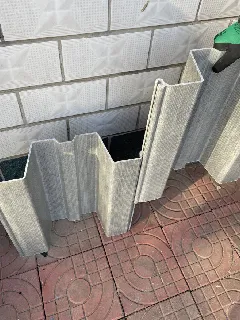loading...
- No. 9, Xingyuan South Street, Dongwaihuan Road, Zaoqiang County, Hengshui, Hebei, China
- admin@zjcomposites.com
- +86 15097380338
- Welcome to visit our website!
liquid filter vessel
Understanding Liquid Filter Vessels Essential Components for Effective Filtration
In various industrial and commercial applications, maintaining the purity and cleanliness of liquids is crucial. Liquid filter vessels play a vital role in achieving this goal. These specialized containers are designed to hold filter media for the purpose of removing impurities, particulates, and contaminants from liquids before they proceed further down the production or processing line. This article explores the significance of liquid filter vessels, their design features, operational principles, and their applications in different industries.
What is a Liquid Filter Vessel?
A liquid filter vessel is a robust container designed to facilitate the filtration of liquids. It typically comprises a durable outer shell, various internal components, and a combination of filter media that may include mesh, fabric, or specialized filtration elements. The primary function of these vessels is to ensure that only clean liquid is allowed to pass through, while contaminants are captured and retained within the filter media.
Importance of Liquid Filter Vessels
Liquid filtration is indispensable in many sectors, including pharmaceuticals, food and beverage, chemicals, and water treatment. The significance of liquid filter vessels can be summarized in several key points
1. Contamination Control These vessels effectively remove particulate matter, suspended solids, bacteria, and other contaminants, ensuring the quality and safety of the final product.
2. Process Efficiency By preventing the entry of impurities into machinery and pipelines, liquid filter vessels help in reducing wear and tear on equipment, leading to lower maintenance costs and increased operational efficiency.
3. Regulatory Compliance Many industries are governed by strict regulations concerning product purity and safety. Using liquid filter vessels can help ensure compliance with these standards, mitigating the risk of contamination-related issues.
4. Cost-Effectiveness Although there is an upfront investment in liquid filter vessels and their maintenance, the long-term savings associated with reduced downtime, fewer product recalls, and lower maintenance costs make them a cost-effective solution.
Design Features
Liquid filter vessels come in various designs and sizes, tailored to meet specific filtration requirements. Some common features include
liquid filter vessel

- Material Construction Vessels are typically made from stainless steel, carbon steel, or plastic, depending on the nature of the liquid being filtered and the operating conditions.
- Modular Design Many liquid filter vessels are designed to be modular, allowing for easy replacement of filter elements and maintenance, thereby minimizing downtime.
- Flow Management The design often includes features for managing both inlet and outlet flow, ensuring optimal filtration performance without compromising the integrity of the system.
- Inspection and Cleaning Ports To facilitate regular maintenance and cleaning, filter vessels are often equipped with ports that allow for ease of access to the filter media.
Operational Principles
The operation of a liquid filter vessel is relatively straightforward. Liquid enters through the inlet, where it undergoes a pre-filtration phase if necessary. It then flows through the filter media, which captures contaminants and allows clean liquid to exit through the outlet. Over time, the filter media can become clogged, necessitating maintenance or replacement.
There are various types of filtration methods employed, including gravity filtration, pressure filtration, and vacuum filtration. The choice of filtration method often depends on the specific application and the characteristics of the liquid being filtered.
Applications Across Industries
Liquid filter vessels find extensive use across different sectors. In water treatment plants, they help purify drinking water by removing harmful micro-organisms and pollutants. In the food and beverage industry, they are essential for maintaining the quality and safety of products such as juices, oils, and dairy. The chemical industry relies on these vessels to ensure the purity of chemicals and solvents, while pharmaceutical manufacturers use them for critical processes where contamination can have serious repercussions.
Conclusion
In summary, liquid filter vessels are integral to various industries that require clean, contaminant-free liquids. Their ability to enhance process efficiency, ensure regulatory compliance, and control contamination makes them indispensable tools in modern manufacturing and processing environments. As industries continue to prioritize quality and efficiency, the use of advanced liquid filter vessels will undoubtedly grow, paving the way for better filtration technologies and practices.
-
The Rise of FRP Profiles: Strong, Lightweight, and Built to LastNewsJul.14,2025
-
SMC Panel Tanks: A Modern Water Storage Solution for All EnvironmentsNewsJul.14,2025
-
GRP Grating: A Modern Solution for Safe and Durable Access SystemsNewsJul.14,2025
-
Galvanized Steel Water Tanks: Durable, Reliable, and Ready for UseNewsJul.14,2025
-
FRP Mini Mesh Grating: The Safer, Smarter Flooring SolutionNewsJul.14,2025
-
Exploring FRP Vessels: Durable Solutions for Modern Fluid HandlingNewsJul.14,2025
-
GRP Structures: The Future of Lightweight, High-Performance EngineeringNewsJun.20,2025
